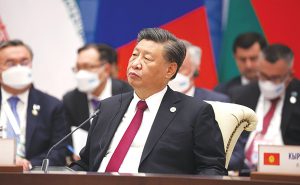Every Chinese leader stamps their mark on the country they rule for five, 10, (or 15) years. Xi Jinping’s brand is indelible, but the technology companies which have powered China’s economic rise over the past decade will be searching for clues on how to navigate his third term.
When Xi took power in March 2013, Tencent Holdings Ltd. stood at a lonely 11th spot as the only technology company among China’s 20 largest by market value. Today, the games and social media behemoth stands at the top, accompanied by six others including Alibaba Group Holding Ltd. in fourth, ahead of bookings and deliveries provider Meituan at number 11.
Executives and shareholders at these new giants have good reason to feel hard done by over the past few years. The Covid outbreak was a great opportunity for China’s technology leaders to prove their worth to the nation, offering a plethora of products to help citizens and companies survive rigid lockdowns and economic upheaval. Yet Tencent and Alibaba now trade lower than they did three years ago, before the virus crept out of Wuhan.
A good portion of the blame can be attributed to “common prosperity,†a term first coined by Mao Zedong, but which became a battle cry under Xi last year to “increase the size of middle-income groups.†Companies were quick to jump aboard, telling investors — and Beijing — that they were ready to play their part.
“We have actively worked on shouldering more social responsibility and creating greater value while promoting common prosperity for the larger society including our delivery riders, merchants, consumers, and other business partners,†Meituan Chief Executive Officer Wang Xing said in August 2021. Tencent “invested actively in key strategic areas as well as in frontier technologies, along with making new commitments in common prosperity initiatives,†Chairman Pony Ma said in an earnings call a year ago.
But, as my colleague Shuli Ren noted this month, common prosperity has morphed into common poverty as everyone got poorer and China failed to broaden its middle class. It seems the buzzword even fell out of favor this year, although it has been revived in recent weeks and has popped up in state media with increasing frequency.
Beijing’s “plan to reduce inequalities throughout the country,†as common prosperity is now described, doesn’t completely explain the troubles facing China’s technology companies, though. In fact, the challenges preceded it. Jack Ma’s ill-advised speech at the October 2020 Bund Forum in Shanghai — wherein he criticized banks and regulators — resulted in the nixed public offering of his fintech Ant Group Co. Ma, founder of Alibaba and once China’s richest man, flew too close to the sun and got burnt.
While that one incident, and its fallout, was a shock to the sector, it doesn’t entirely explain the diminished fortunes of China tech. A series of regulatory actions over the past few years — collectively labeled a crackdown — help to describe multiple examples of Beijing’s heavy hand at work. Education companies had their business models pulled from under them, games firms went through repeated bouts of censorship and content renovation, while e-commerce players were hit with punishing antitrust fines.
The end result is a growing list of Chinese technology companies who’ve run afoul of regulators. Yet still lacking is clarity as to what executives need to do in order to stay on Beijing’s good side.
The communique from last week’s Seventh Plenary Session of the 19th Central Committee of the Communist Party of China, a prelude to this week’s 20th Party Congress, does offer some clues. The term “common prosperity†didn’t appear once, yet “Socialism with Chinese Characteristics†was featured eight times — on five occasions coupled with the suffix “for a New Era.†But the term was used more as a platitude, without much elaboration or concrete policy. Such details are expected to be fleshed out during this week’s congress and offered up during and after the event.
Even then, there’s no guarantee that regulators will be willing, or even able, to offer clear guidance on how companies should operate during Xi’s third term. Criticizing the government and ripping off consumers are obvious landmines, but how to run an education company or offer delivery services are the nuts-and-bolts executives will need to navigate their multibillion-dollar companies.
—Bloomberg
Marcus Ashworth is a Bloomberg Opinion columnist covering European markets. Previously, he was chief markets strategist for Haitong Securities in London Advertisement BUSINESS We Need to Build a Better Flu Shot Analysis by Lisa Jarvis | Bloomberg October 18, 2022 at 8:42 a.m. EDT The balloons are a nice touch.
The balloons are a nice touch. (Photographer: Bloomberg)
Comment Gift Article Share
It’s the time of year when US public health officials are practically begging people to go out and get a flu vaccine. This year, their message is particularly urgent: Protect yourself now because the country might be in for a bad flu season that coincides with a resurgence in Covid cases.
0
Comments
Gift Article
View more
Advertisement
Advertisement
TOP STORIES
Advice for Real Life
Advice for the relationships in your life and how to boost your own well-being.
Miss Manners: Former boss keeps fishing for gifts for her sons
Carolyn Hax: Are all connections healthy, or can we skip dull relatives?
Ask Amy: How do I talk to my mom about the past if she denies everything?
Try a different topic
Sign in or create a free account to save your preferences
Advertisement
Advertisement
Company
About The Post
Newsroom Policies & Standards
Diversity and Inclusion
Careers
Media & Community Relations
WP Creative Group
Accessibility Statement
Get The Post
Become a Subscriber
Gift Subscriptions
Mobile & Apps
Newsletters & Alerts
Washington Post Live
Reprints & Permissions
Post Store
Books & E-Books
Newspaper in Education
Print Archives (Subscribers Only)
e-Replica
Today’s Paper
Public Notices
Contact Us
Contact the Newsroom
Contact Customer Care
Contact the Opinions team
Advertise
Licensing & Syndication
Request a Correction
Send a News Tip
Report a Vulnerability
Terms of Use
Digital Products Terms of Sale
Print Products Terms of Sale
Terms of Service
Privacy Policy
Cookie Settings
Submissions & Discussion Policy
RSS Terms of Service
Ad Choices
washingtonpost.com © 1996-2022 The Washington Post
Already a subscriber? Sign in
Get unlimited access to The Washington Post
You can cancel anytime.
MONTHLY
$4 USD every four weeks
for the first year
BEST VALUE
YEARLY
$29 USD for the first year
Subscribe
Subscribe with paypal logo
View more offers
 The Gulf Time Newspaper One of the finest business newspapers in the UAE brought to you by our professional writers and editors.
The Gulf Time Newspaper One of the finest business newspapers in the UAE brought to you by our professional writers and editors.

